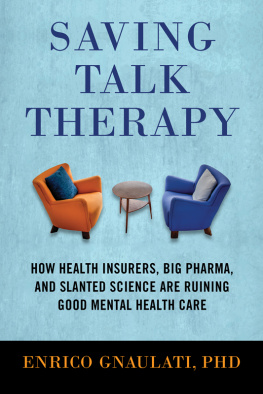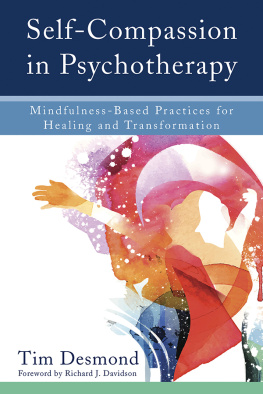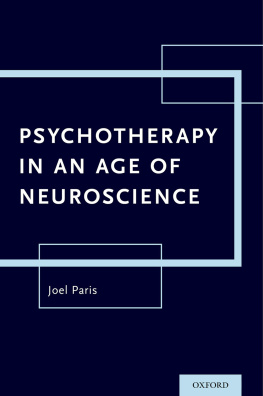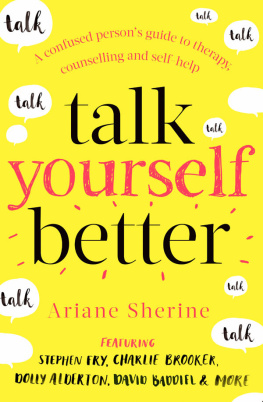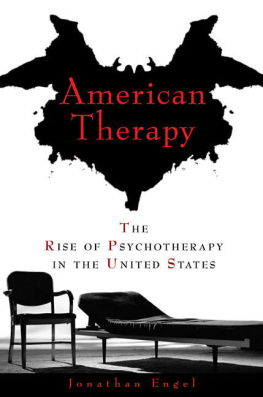
To Tom,
a perpetual source
of clinical inspiration
INTRODUCTION
THE PRIMARY AIM of this book is to evocatively document and help preserve the practice of traditional talk therapy at a time when its availability is in decline. No less important is my attempt to unpack the reasons for that declinethe questionable arrangement of economic incentives promoted by the health insurance and pharmaceutical industries, as well as biased academic research that leads to the overvaluing of medications and quick-fix therapies in our culture. One motive for writing it is personal. Coming of age in the early 1980s, I was a forlorn, shame-prone, desperate-to-be-loved young man with an enfeebled sense of self. Therapy was psychological oxygen for me. It enabled me to chip away at the shame, lessen the desperation, feel lovable, and begin to acquire a solid sense of self. Therapy was not set up as a quasi-medical endeavor aimed at lessening my symptoms of anxiety and depressionas is mostly the case these days. I experienced it in psychological-qua-spiritual terms as vital to liberating my capacity to live more intentionally and act more lovingly. Before long, I desired not only to pursue therapy but also to offer its wonders to others. I changed my career plans accordingly.
Back then, troubled souls like me could find an abundance of books written by humanistically oriented psychoanalysts. Classics like Rollo Mays Love and Will, Erich Fromms Escape from Freedom, Karen Horneys Are You Considering Psychoanalysis?, and Alice Millers Drama of the Gifted Child were written in accessible language, spoke directly to my angst, and reinforced all that I was learning about myself in therapy. Nowadays, leading figures in psychoanalytic and existential-humanistic psychology (the schools of therapy I associate with traditional talk therapy) mainly write books using dense clinical jargon for fellow professionals. On reading such texts, someone seeking insight into his or her own human predicament would need a glossary of terms to decipher the specialized clinical terminology. The act of reading would turn into a form of puzzle solving rather than something emotionally inspiring. I shudder to think how I would have turned out if I had had no access to books like those mentioned or to quality talk therapy.
People who entertain the idea of going into therapy often conjure up an image of a distressed person talking freely and openly to a skilled and devoted listener. They probably assume a therapist will want to hear what ails them in ordinary human terms: how they are trapped in a loveless marriage; how they feel empty and adrift in life; how they are completely emotionally drained by parental chores and have precious little time for themselves; how they are counting down the days to retirement, ten years out; how marital disagreements always lead to days of stalemate; how they prematurely committed to a career to please their parents. They probably expect some exploration of painful childhood events. They might guess that therapy will take time since its hard to untangle life problems that are decades in the making or to undo unpleasant personality traits that cannot just be willed away.
These images encapsulate the most humanistic aspects of Freuds original therapy model. In this model, the analyst embodies a serene and open-minded presence (evenly hovering attention) as the patient earnestly strives for honest self-disclosure (free association). So, theres a legacy I hope to continue. I want this book to be highly readable and offer up usable personal insights. I also aim to thoroughly acquaint you with the history and practice of talk therapy. In this way, I hope to sharpen your appreciation for talk therapys unsurpassed benefits as a cultural medium to maximize peoples ability to live more intentionally and act more lovingly. In the first two chapters, I step back in time to illustrate how Freud actually conducted psychoanalysis, as distinct from how he recommended that it should be conducted. Well look through the eyes of several patients who went on record about their experience. Remarkably, talk therapy had to be rescued from none other than Freud himself because of his frequent refusal to take patients painful disclosures at face value; instead, he badgered them into admitting to esoteric sexual fantasies.
The person who rescued talk therapy from Freud was a little-known Hungarian psychoanalyst named Sndor Ferenczi. It was Ferenczis brand of psychoanalysisshowing genuine regard for patients and consensually validating their real sources of upsetthat influenced a whole generation of American psychoanalysts during and after World War II. Indeed, the widespread availability of talk therapy to military personnel pre- and postwar was responsible for its increased popularity. Movie depictions of psychoanalysis and celebrities writing and talking about their time on the couch furthered the popularity of talk therapy. The practice seemed cemented as a treasured cultural resource.
All this was before Prozac, managed care, and the privileging of short-term therapy that focused on solutions and reducing symptoms. These days, what legions of people experience when they pursue therapy is starkly different. The psychotherapy office is less of the cultural sanctum it once was, less a place that gives people permission and ample time to step back from life to explore, verbally process, understand, and master dark emotions. Most people enter therapy expecting talk therapy, only to encounter a therapist poised to offer so-called evidence-based cognitive behavioral therapy (CBT) techniques, whose job is to shunt the discussion in the direction of eliminating symptoms and addressing thinking errors. A sizable part of the therapy takes place outside the office in the form of homework geared toward a clients jotting down and changing dysfunctional thought patterns. Theres also an increasing use of smartphone apps and web-based programs to help clients monitor their negative thinking and track behavior goals.
A client recently told me of her former therapists use of such a practice. The therapist called it cubbyholing and framed it as a scientifically validated procedure to help people develop a more balanced mind. The client was advised by her therapist to carve out time between therapy sessions and use worksheets on a website to type out thoughts that were causing her to make poor life decisions. My client confessed to me that she found the whole procedure artificial. She felt that cubbyholing satisfied the therapists need for a cheat sheet with which to conduct therapy, as opposed to just listening to my client discuss issues that mattered to her as they arose naturally. Practiced like this, in the least sophisticated way, CBT treats the mind as a sort of computer in need of reprogramming. Therapy becomes like a software update, where kinks in thinking are corrected. It is not uncommon for therapy sessions to be spaced weeks apart and for a full course of treatment to entail a dozen sessions or fewer.
Nowadays, people dont go into therapy (with all the soul-searching this implies); they receive mental health interventions. And medications have long since become the dominant mental health intervention. The entire enterprise of seeing a shrink has been shrunk. In , Ill be picking apart and documenting the factors that led to this state of affairs. I argue that they have neither improved mental health care nor realized true cost savings.

